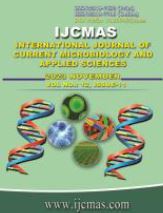


 National Academy of Agricultural Sciences (NAAS)
National Academy of Agricultural Sciences (NAAS)

|
PRINT ISSN : 2319-7692
Online ISSN : 2319-7706 Issues : 12 per year Publisher : Excellent Publishers Email : editorijcmas@gmail.com / submit@ijcmas.com Editor-in-chief: Dr.M.Prakash Index Copernicus ICV 2018: 95.39 NAAS RATING 2020: 5.38 |
FAME analysis is used as a first line bacterial species identification method. Currently, this analysis is done by commercial systems such as Sherlock Microbial Identification (MIS, Microbial ID, Inc (MIDI), Newark, Delaware, U.S.A. However, the identification libraries of this system are not adaptable to the very rapidly changing and expanding bacterial taxonomy. This problem can be solved by the application of machine learning techniques, which are mathematical models that can learn from experience. Training these models with up to date information can very rapidly be achieved, and are, therefore very suitable to solve the present identification problem. Objective: The present paper deals with the detailed study on FAME analysis of four strains of bacterial genera Bacillus with MTCC no.9479, 9523, 9524 & 9526 and one actinomycetes of Nocardiopsis with MTCC no. 9525 from some selected wetlands of North Bihar. It also emphasizes on the detailed study of Similarity Index (SI) which expresses how closely the fatty acid composition of an unknown compares with the mean fatty acid composition of the strains used to create the library entry listed as its match. Methods: The fatty acids were extracted by a procedure which consists of saponification in diliute sodium hydroxide/methanol solution followed by derivatization with dilute hydrochloric acid/methanol solution to give the respective methyl esters (FAMEs). The FAMEs were then extracted from the aqueous phase by the use of an organic solvent and the resulting extract was analyzed by GLC. Results: Strain SM8 showed a S.I. value of 0.021. Strain SM10 showed a S.I. value of 0.058 and 0.048. Strain SM2A showed a S.I. value of 0.413 and 0.253 & also 0.120 and 0.112 for different entry names in the library. Strain SM18A showed a S.I. value of 0.491 and 0.445. Strain BC7A showed a S.I. value of 0.376, 0.369 and 0.308. Conclusions: After the extensive study on the morphological, phyico-chemical and biochemical aspects of microbes isolated from selected wetlands of North Bihar, 5 test isolates were selected for FAME analysis. It was concluded that strain SM18A can be considered as good library comparisons. As compared to SM18A, rest three starins viz SM8, SM10 and SM2A could not be considered as good library comparisons. Strain BC7A could be considered as a good match, but an atypical strain.
 |
 |
 |
 |
 |